Energy drinks and diabetes
Energy drinks are often thought to contain a lot of sugar, but in reality, they typically have about the same amount of sugar as regular soft drinks. So, they don't actually contain an unusually large amount of sugar.
However, there’s no doubt that they do contain sugar, so let's consider whether energy drinks could be a cause of diabetes.
 Author: Energy Drink-kun
Author: Energy Drink-kun
In 2001, while living in the United States, I encountered energy drinks through the dance scene and was deeply impressed. After returning to Japan, I found that energy drinks were considered novelty beverages, so I established a comprehensive website in 2013 to share the true appeal of energy drinks. As an energy drink enthusiast, I began drinking them seriously again, collecting over 8,000 varieties of energy drinks from various countries. I am also active as a critic and expert, receiving media interviews.
Causes of Diabetes
- Type 1 Diabetes: The destruction of pancreatic β-cells (cause unknown), leading to significant disruption in insulin secretion.
- Type 2 Diabetes: Caused by genetics, age, obesity, and lifestyle habits that result in insufficient insulin secretion.
Although the mechanism of Type 1 diabetes is understood, the exact cause of the destruction of β-cells is unclear, though it is believed to be related to immune factors.
Type 2 diabetes is caused by genetic factors and environmental factors such as obesity, overeating, and lack of exercise. It's not just the excessive intake of sugar, but also the consumption of foods high in fat that can contribute to overall obesity, increasing the risk. Therefore, it’s important to reconsider unhealthy eating habits in general, not just energy drinks.
Risk Factors and Improvements
- Avoid overeating and eating too quickly.
- Start meals with vegetables.
- Take plenty of fiber-rich vegetables and fruits.
- Avoid animal fats and eat more fish, such as blue fish.
- Avoid foods high in cholesterol.
- Limit salt intake.
- Drink alcohol in moderation.
- Maintain a regular exercise routine.
- Quit smoking.
- Manage stress.
This list is from the Health Insurance Association, and notably, it does not mention reducing sugar intake. Similarly, most public health organizations focus on overall dietary improvements rather than singling out sugar as the main culprit.
Reference Sites
Relationship Between Sugar Intake and Diabetes
From the name "diabetes," the association with sugar is often made, and it is commonly argued that "sugar intake is one of the causes of diabetes, and reducing sugar intake is necessary for prevention and treatment." However, despite the fact that Japanese sugar consumption has been decreasing over the years, the rate of diabetes has been increasing. This means there is no clear correlation between sugar consumption and diabetes.
Source: Agricultural and Livestock Industries Corporation
It’s clear that sugar is one of the risk factors, but it’s a misunderstanding that sugar alone is the cause of diabetes, despite the name.
Multi-Purpose Cohort Study: A 5 and 10-Year Follow-Up on the Consumption of Sugary Beverages
The study tracked the consumption of "cola and juice drinks (less than 100% juice)," "100% fruit juice," and "vegetable juice" over 5 years (30,861 people) and 10 years (27,585 people) to summarize the risk of developing diabetes.
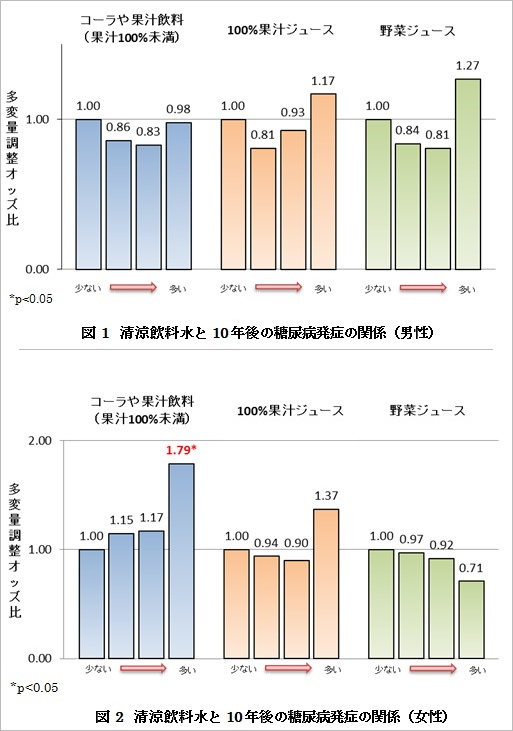
Looking at the graph, it’s interesting that while men show little change in risk regardless of how much cola or juice they consume, women have a significantly higher risk. This may be because women generally have smaller body sizes and lower physical activity levels.
Energy drinks, soft drinks, fruit juices, vegetable juices, and other beverages that add extra calories and sugars apart from regular meals can indeed raise the risk of diabetes. However, it’s important to note that sugar alone is not the sole cause. The risk is much higher in cases where excess fats, carbohydrates, and overall calories are consumed due to a poor diet and low physical activity.


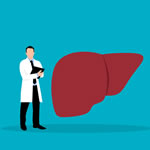

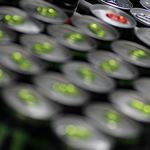
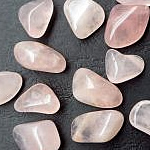
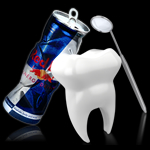
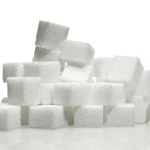
 Since 2001, Energy Drink Maniac has been drinking energy drinks and providing the most detailed reviews of global energy drinks based on firsthand research.
Since 2001, Energy Drink Maniac has been drinking energy drinks and providing the most detailed reviews of global energy drinks based on firsthand research.